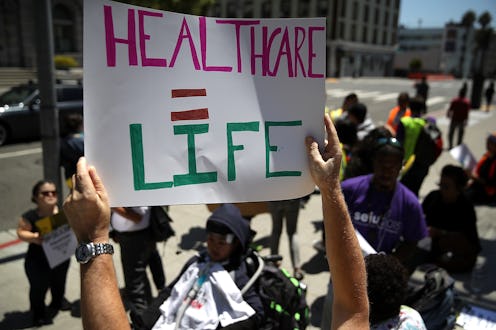News
You Need To Read This One Part Of The CBO Health Care Report

The Congressional Budget Office released its analysis of Senate Republicans’ health care bill on Monday, and found that if the legislation were enacted, it would leave an additional 22 million Americans without health insurance by 2026. But if you only read one line from the CBO report, it should be the one that highlights just how hard it would be for the poorest Americans to buy health insurance.
"Despite being eligible for premium tax credits, few low-income people would purchase any plan" at all if the Republican bill became law, the CBO report says. The reason has to do with the fact that in practice, people with health insurance pay for medical care at two stages: First, there's the flat monthly fee they pay in order stay on their plan (the premium); then, there's minimum upfront cost they're required to pay if they actually use their insurance (the deductible).
What the CBO found is that under the Republicans' bill, the only insurance plans affordable to low-income Americans would come with prohibitively high deductibles. This means that a low-income person who was insured under such a plan wouldn't be able to actually get medical care if they needed it, because they wouldn't be able to pay the deductible. As such, the CBO concluded, they might simply forego health insurance altogether.
In short, the GOP bill would price poor people out of health insurance altogether. Plans that came with deductibles they could afford would have premiums they couldn't afford, and vice-versa.
Here are a couple of examples of how this might play out. From the CBO report (emphasis mine):
People with income below 100 percent of the [federal poverty line] who were not eligible for Medicaid could generally receive premium tax credits under this legislation and not under current law. However, even with the net premium of $300 shown in the illustrative examples for a person with income at 75 percent of the FPL ($11,400 in 2026), the deductible would be more than half their annual income. The net premium of a silver plan for a 40-year-old would be about 15 percent of their annual income, and the deductible would be more than one-third of their annual income. Many people in that situation would not purchase any plan, CBO and JCT estimate, although some people with assets to protect or who expect to have high use of health care would.
This is one way in which the bill would reduce the poorest Americans' ability to access medical care, but it's not the only one. The legislation also cuts Medicaid spending, reduces in federal assistance for Americans purchasing health care, and defunds Planned Parenthood, which is often the only source of affordable health care for low-income women, for a year.
High-earning Americans would fare much better under the bill, however, because the legislation repeals many of Obamacare's taxes on high-income earners. According to the Tax Policy Center, in 2026, the top 1 percent of earners would take home an extra $45,500 per year on average if the GOP bill became law, while the top 0.1 percent of earners would each receive an average tax cut of $250,000 every year.